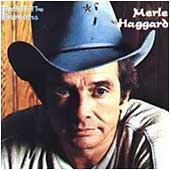Back to the Barrooms
| Back to the Barrooms | ||||
|---|---|---|---|---|
 |
||||
| Studio album by Merle Haggard | ||||
| Released | October 10, 1980 | |||
| Recorded | June 1980, Nashville, TN | |||
| Genre | Country | |||
| Length | 35:34 | |||
| Label | MCA 5139 | |||
| Producer | Jimmy Bowen | |||
| Merle Haggard chronology | ||||
|
||||
| Professional ratings | |
|---|---|
| Review scores | |
| Source | Rating |
| Allmusic |
|
Back to the Barrooms is the 31st studio album by American country singer Merle Haggard, released in October 1980.
As the title suggests, Back to the Barrooms features some of Haggard's hardest drinking songs since his early honky-tonk classics "Swinging Doors" and "The Bottle Let Me Down." "I Think I'll Just Stay Here and Drink," his only solo #1 hit at MCA, features an extended jam unusual for a country single at the time, consisting of Larry Muhobarec on piano, Don Markham on saxophone, and Reggie Young on guitar. The self-explanatory "I Don't Want To Sober Up Tonight" and the title track are also unabashed odes to getting drunk. The single "Misery and Gin" had appeared on the soundtrack to the film Bronco Billy, in which Haggard had a cameo role, appearing as himself. A music video was also made for the song.
"Leonard" is Haggard's tribute to his friend and mentor Tommy Collins. Haggard had been recording songs written by Collins throughout his career, beginning with the novelty "Sam Hill" in 1964 and scoring a #1 single with "Carolyn" in 1971. Collins, who had never heard the song, was in the studio the day Haggard cut it and, as he tells Daniel Cooper in the liner notes to the 1994 box set Down Every Road, he was overwhelmed: "It's hard to describe how you feel when you first fall in love, it's hard to explain how you feel when you become the father of a child. It's one of those things it's hard to explain. I was very honored, and very humbled by the fact that he did that." The song became a Top 10 hit.
Other notable tracks include the cover of the Hank Williams, Jr. composition "I Don't Have Any More Love Songs" and "Can't Break the Habit," a song co-authored by Haggard and his third wife Leona Williams. Haggard and Williams, who married in 1978, began having troubles around this time and their divorce would begin Haggard's long descent into alcoholism and cocaine addiction.
...
Wikipedia
